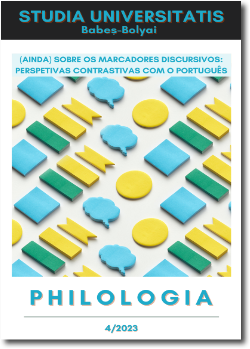CONSTRUÇÕES MARCADORAS DISCURSIVAS FORMADAS POR OLHAR, NO PORTUGUÊS, E GUARDARE, NO ITALIANO: UMA ANÁLISE CONSTRASTIVO-FUNCIONAL
DISCOURSE MARKERS FORMED BY OLHAR IN PORTUGUESE AND GUARDARE IN ITALIAN: A CONTRASTIVE-FUNCTIONAL ANALYSIS
Author(s): Mariangela Rios de OliveiraSubject(s): Descriptive linguistics
Published by: Studia Universitatis Babes-Bolyai
Keywords: discourse markers; contrastive analysis; contexts of use; contemporary Portuguese; contemporary Italian;
Summary/Abstract: Discourse markers formed by olhar in Portuguese and guardare in Italian: a contrastive-functional analysis. Discourse markers (DM) make up a hybrid category and little distinct from the others. As elements outside grammar, these constituents are difficult to delimit and, therefore, difficult to analyze. Based on this consideration, adopting a functionalist theoretical framework combined with the constructional approach to grammar, in the terms of Traugott and Trousdale (2013), Hilpert (2014) and Traugott (2021, 2022), among others, we proceeded to an analysis of a qualitative and contrastive nature of MD formed by the verbs of visual perception (Scheibman 2000) olhar, in Portuguese, and guardare, in Italian, in the detection of their correspondences and distinctions. We assume such MDs as specific pairs of form and meaning in contemporary uses of Portuguese and Italian, as procedural constructions, such as [olha só] and [guarda un po'], respectively. We found that these MDs act in calling attention, in monitoring interaction via manipulation of the virtually idealized attentional space, due to communicative purposes, as defended by Sambrana (2021, 2023), for Portuguese, and Oliveira and Lazzarotto (2022), for Italian. We found that they contribute to this functionality of the MDs researched cognitive processes of general domain, according to Bybee (2010), such as chunking and analogization, and also social cognition, according to Diessel (2017).
Journal: Studia Universitatis Babes-Bolyai - Philologia
- Issue Year: 68/2023
- Issue No: 4
- Page Range: 145-164
- Page Count: 20
- Language: Portuguese

